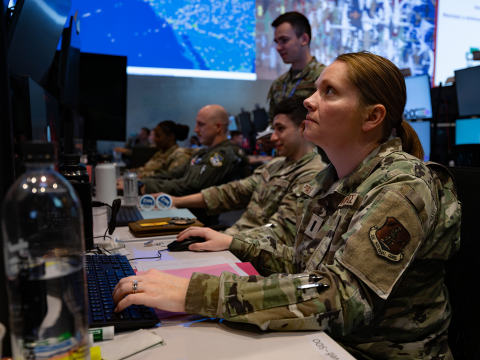Portugal's Government Relies on Commercial Innovation
Non-governmental organization contacts fuel vital coordination between government and industry.
Government laboratories largely generate niche technologies that are specific to the military. The commercial sector is the source of most of
The relationship between Portuguese industry and its government is not too different from that of those two sectors in the
The admiral relates that it was easier for Portuguese industry to interact with its government 10 years ago, but it has become a bit more difficult over the past decade. Accordingly, groups such as the AFCEA Portugal Chapter play an increasingly important role in helping direct industry to solve government needs.
AFCEA’s Portugal Chapter hosts symposia and technical seminars so that
Adm. Rodolfo relates that seminars built along a specific theme often begin with a keynote speaker who is followed by presentations that outline military or government needs—current or future. Supporting technologies are discussed afterward, followed by networking opportunities.
Seminars hosted by the chapter over the past year have focused on interoperability and information system integration for defense; integrated security systems; information technology and sharing services; defense satellite communications; information security; and maritime surveillance and security.
Adm. Rodolfo explains that the Portuguese government does not direct the chapter on seminar subjects. Rather, chapter leadership maintains contacts with government and the private sector to keep abreast of both government requirements and industry technologies. That way, the chapter can tailor its seminars to match needs with emerging capabilities.
The chapter also hosts large events such as its biennial International Symposium on C4I. Next month, it plans to host the First National Congress on Security and Defense, which will feature high-level speakers from several ministries. These events help industry to develop and provide the niche products needed by government and the military, Adm. Rodolfo relates.
Many of these local solutions also can be applied to foreign countries’ requirements, he adds. Among Europe-wide projects in which the chapter has been involved is the Small/Medium Size Enterprise (SME) project. This European Commission project aims at having small and medium-size companies submit proposals for a security effort.
The chapter has established a relationship with a group that is bringing high-technology companies together. “Our mission is aligned with the Portuguese government strategy to contribute to the development of an industry cluster with capabilities in security and defense technologies,” Adm. Rodolfo says. The cluster comprises Portuguese companies and research institutions along with international defense companies.
And, as with many AFCEA chapters, the Portugal Chapter supports advanced education. Portuguese military schools are members of AFCEA, and the chapter provides annual industry-sponsored awards to high-achieving students. The chapter also works with civilian universities and their research centers, particularly in defense and security studies.




Comments